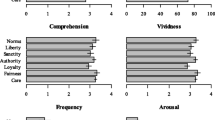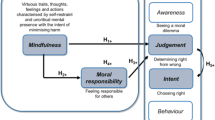Abstract
Some have attempted to explain why it appears that action based on deferential moral belief lacks moral worth by appealing to claims about an attitude that is difficult to acquire through testimony, which theorists have called “moral understanding”. I argue that this state is at least partly non-cognitive. I begin by employing case-driven judgments to undermine the assumption that I argue is responsible for the strangeness of deferential moral belief: the assumption that if an agent knows that some fact gives them a moral reason to act in some way, then they’re in a position to act that way for the moral reason given by that fact. I then argue that cases from non-moral epistemology concerning properly-based belief give us independent reason to reject this assumption and conclude by sketching a Davidson-inspired account of normative reasons that explains why acting for moral reasons requires the right non-cognitive state, which is worth calling a kind of moral understanding.
Similar content being viewed by others
Notes
This thesis might seem, on its face, immediately unacceptable. “Understanding” surely denotes a cognitive state. So moral understanding simply could not be partly non-cognitive. But all this worry shows is that “moral understanding” is a bad name for a partly non-cognitive phenomenon.
Indeed, there’s no deep reason to expect that the state that plays (1), (2), and (3) is factive. Arguments for this claim depend on linguistic properties of the verb to understand. I am suggesting that, perhaps, the state investigated in this debate, which has been called ‘moral understanding’, may not be understanding in the strictest sense, for I find linguistic argument for reductionism about understanding, in the strict sense, compelling.
Alternatively, we could say that a belief is strictly based on testimony just in case all the motivating (or as Scanlon calls them, optative) reasons responsible for the belief are only facts of the form ⌜A testified that r⌝, for some informant A and proposition or fact r. I take no stand on which view is correct.
See, e.g., Sliwa (2016, 2017) and Lawler ( forthcoming; 2018).
I’m drawing particularly on Schroeder (2007, Ch.2)‘s understanding of background conditions.
Hills’s full-blooded analysis involves six conditions, each of which the agent must satisfy to some extent — see Hills (2009, 103). For reasons of space, I offer an abridged characterization.
I’m taking “evidence” as shorthand for normative reasons for belief of the right kind. For more on the claim that the possession relation agents and reasons is cognitive, see, inter alia, Dancy (2000), Lord (2008, 2014), and Schroeder (2007, 2011). Lord’s more recent work (2017, 2018) complicates the claim that the possession relation is cognitive.
Lord and Sylvan do not claim to have invented this style of case. They attribute similar cases to Goldman, Swain, Millar, Turri, and Armstrong, inter alia.
Davidson’s view is more accurately described as the view that reasons are pairs of beliefs and pro-attitudes. For simplicity, I’m glossing pro-attitudes as “desires”.
Howard (n.d).
Thanks to Mark Schroeder, Ralph Wedgwood, Steve Finlay, John Hawthorne, Nate Charlow, Alexander Dietz, Joe Horton, Jon Wright, Max Asher Lewis, Alison Hills, and Errol Lord.
References
Aristotle (2009) Nicomachean ethics (Oxford world’s classics). (trans: WD Ross and Lesley Brown) Oxford University Press, New York
Arpaly N (2002a) Unprincipled virtue: an inquiry into moral agency. Oxford University Press
Arpaly N (2002b) Moral worth. J Philos 99(5):223–245
Broome J (2004) Reasons. In: Jay Wallace R (ed) Reason and value: themes from the moral philosophy of Joseph Raz. Oxford University Press, pp 204–228
Broome J (2013) Rationality through reasoning. John Wiley & Sons
Callahan LF (2017) “Moral understanding: a re-conceived understanding explanation.” Philos Q 0 01–23
Dancy J (2000) Practical reality. Clarendon Press
Davidson D (1963) Actions, reasons, and causes. J Philos 60(23):685–700
Finlay S (2006) The reasons that matter. Australas J Philos 84:1–20
Finlay S (2014) Confusion of tongues. Oxford University Press
Fletcher G (2016) Moral testimony: once more with feeling. In: Shafer-Landau R, Shafer-Landau R (eds) Oxford studies in Metaethics. Oxford University Press, Oxford
Gregory A (2016) Reasons as good bases. Philosophical Studies 173(9):2291–2310
Hills A (2009) Moral testimony and moral epistemology. Ethics 120(1):94–127
Howard C (forthcoming) “The Fundamentality of fit”. In: Shafer-Landau (ed) Oxford Studies in Metaethics
Howard, NR (n.d) “Facts are of the Wrong Kind to be Reasons.” Manuscript: The University of Southern California
Howell R (2014) Google morals, virtue, and the asymmetry of deference. Noûs 48:389–415
Korsgaard CM (1996) The sources of normativity. Cambridge University Press
Lawler I (2016) Reductionism about understanding why. Proc Aristot Soc 116(2):229–236
Lawler (forthcoming) I “Understanding why, knowing why, and cognitive achievements.” Synthese
Lord E (2008) Dancy on acting for the right reason. J Ethics Soc Philos 2(3):1–7
Lord E (2014) The coherent and the rational. Analytic Philosophy 55(2):151–175
Lord E (2017) What you’re rationally required to do and what you ought to do (are the same thing!). Mind:fzw023
Lord E (2018) The importance of being rational. Oxford University Press, Oxford
Lord E, Sylvan K (forthcoming) “Prime time for the basing relation”. In: Bondy P, etc. Well founded belief: New essays on the epistemic basing relation. Routledge Press
Lord, Errol. (forthcoming) “How to Learn about Aesthetics and Morality Through Acquaintance and Testimony” in Shafer-Landau (ed) Oxford Studies in Metaethics
Maguire B (2016) The value-based theory of reasons. Ergo 3
Manne K (2016) “Democratizing humeanism.” In: Maguire B, Lord E (eds) Weighing reasons 123–140
Markovits J (2010) Acting for the right reasons. Philos Rev 119(2):201–242
McHugh C, Way J (2016) Fittingness first. Ethics 126(3):575–606
Price R (1991) A review of the principal questions in morals. In: Raphael D (ed) British moralists, Hackett publishing, Indianapolis, 1650–1800:131–34
Riaz A (2015) Moral understanding and knowledge. Philos Stud 172(1):113–128
Scanlon TM (1998) What we owe to each other. Harvard University Press
Schroeder M (2007) Slaves of the passions. Oxford University Press
Schroeder M (2011) “What does it take to ‘Have’ a reason?” In: Reisner A, Steglich-Petersen A (eds) Reasons for belief, Cambridge University Press
Setiya K (2007) Reasons without rationalism. Princeton University Press
Sliwa P (2012) In defense of moral testimony. Philos Stud 158(2):175–195
Sliwa P (2016) Moral worth and moral knowledge. Philos Phenomenol Res 93(2):393–418
Sliwa P (2017) Moral understanding as knowing right from wrong. Ethics 127(3):521–552
Smith M (1994) The moral problem. Blackwell Publishing
Star D (2015) Knowing better. Oxford University Press
Street S (2008) Constructivism about reasons. Oxford studies in metaethics 3:207–245
Street S (2012) “Coming to terms with contingency: Humean constructivism about practical reason.” In: Lenman J, Shemmer Y (eds) Constructivism in practical philosophy. Oxford University Press
Velleman D (2000) The possibility of practical reason. Oxford University Press
Wedgwood R (2017) The value of rationality. Oxford University Press
Yetter Chappell R (2012) Fittingness: the sole normative primitive. Philos Q 62(249):684–704
Author information
Authors and Affiliations
Corresponding author
Rights and permissions
About this article
Cite this article
Howard, N.R. Sentimentalism about Moral Understanding. Ethic Theory Moral Prac 21, 1065–1078 (2018). https://doi.org/10.1007/s10677-018-9946-y
Accepted:
Published:
Issue Date:
DOI: https://doi.org/10.1007/s10677-018-9946-y




